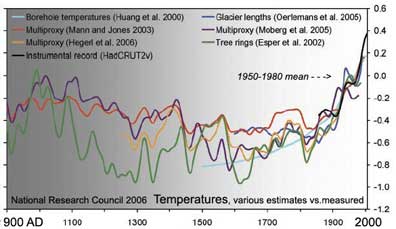|
 In general global temperatures have risen since the 19th century industrial revolution. There is little scientific question
the reason is a steep increase in atmospheric carbon dioxide -- CO2 -- from human use of fossil fuels. Methane, ozone, other
gases and dusts have also increased greatly. The mechanism of our atmosphere is that gases like CO2 and methane trap some
of the sun's radiation and hold it in the lower atmosphere, heating it. The natural greenhouse effect made the earth warm
enough for life, but the effect is much higher now. Ice core records show that whenever CO2 has increased in the earth's past,
so has temperature. The recent increase in atmospheric CO2 is 200 times as great as any previous change seen in the ice cores.
The current level is 380 parts per million, the highest in more than 650,000 years. It shows no signs of decreasing. In general global temperatures have risen since the 19th century industrial revolution. There is little scientific question
the reason is a steep increase in atmospheric carbon dioxide -- CO2 -- from human use of fossil fuels. Methane, ozone, other
gases and dusts have also increased greatly. The mechanism of our atmosphere is that gases like CO2 and methane trap some
of the sun's radiation and hold it in the lower atmosphere, heating it. The natural greenhouse effect made the earth warm
enough for life, but the effect is much higher now. Ice core records show that whenever CO2 has increased in the earth's past,
so has temperature. The recent increase in atmospheric CO2 is 200 times as great as any previous change seen in the ice cores.
The current level is 380 parts per million, the highest in more than 650,000 years. It shows no signs of decreasing.
Global Warming Is Affecting
Arctic Faster, WWF Says (Update1)
By Alex Morales
April 24 (Bloomberg) -- Global warming is hitting the Arctic harder and
faster than scientists expected, causing unforeseen changes to the frigid region's ice, wildlife, atmosphere and oceans, the
conservation group WWF said.
The most prominent differences observed over the last three years include
a ``massively accelerated'' decline in summer sea ice and ``much greater'' shrinking of the Greenland Ice Sheet, the environmental
campaign group, known in the U.S. as the World Wildlife Fund, said in a 123-page report today.
The World View of Global Warming project is documenting this change
through science photography from the Arctic to Antarctica, from glaciers to the oceans, across all climate zones. Rapid
climate change and its effects is fast becoming one of the prime events of the 21st century. It is real and it is accelerating
across the globe. As the effects of this change combine with overpopulation and weather crises, climate disruptions
will affect more people than does war.
The 2005 average global temperature equaled (within several hundredths
of a degree) the record warm year of 1998, according to meteorologists. 2002-4 were nearly as warm, and the 11 warmest years
on record have all occurred since 1990. In response, our planet has been changing with warming winds and rising seas. At the
poles and in mountains, ice is under fire and glaciers are receding. Down into the temperate zone, change is rearranging the
boundaries of life. The plants and animals with whom we share the planet are adapting and moving -- some even going extinct
-- because they have no choice.
Comments:
Send:Comments
Grade (on a scale of 10): 6
|
